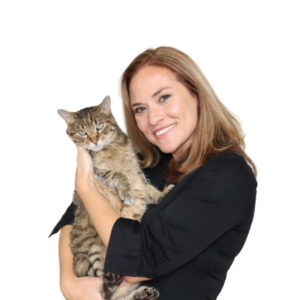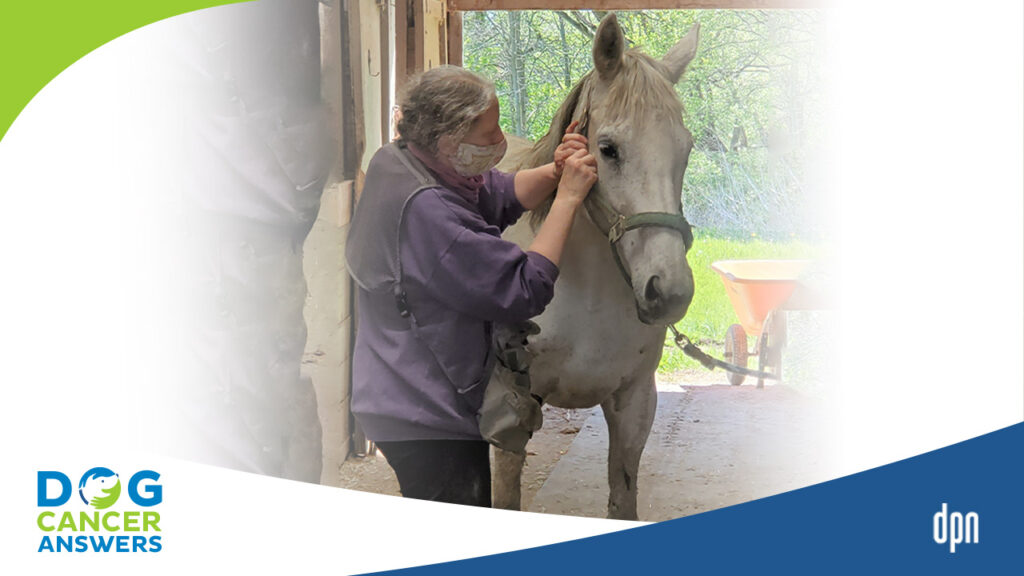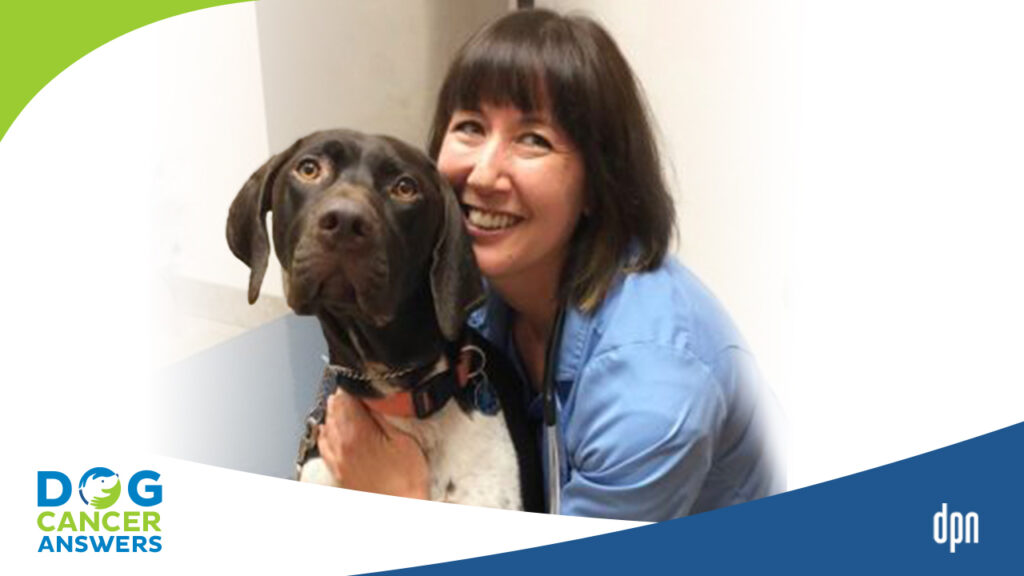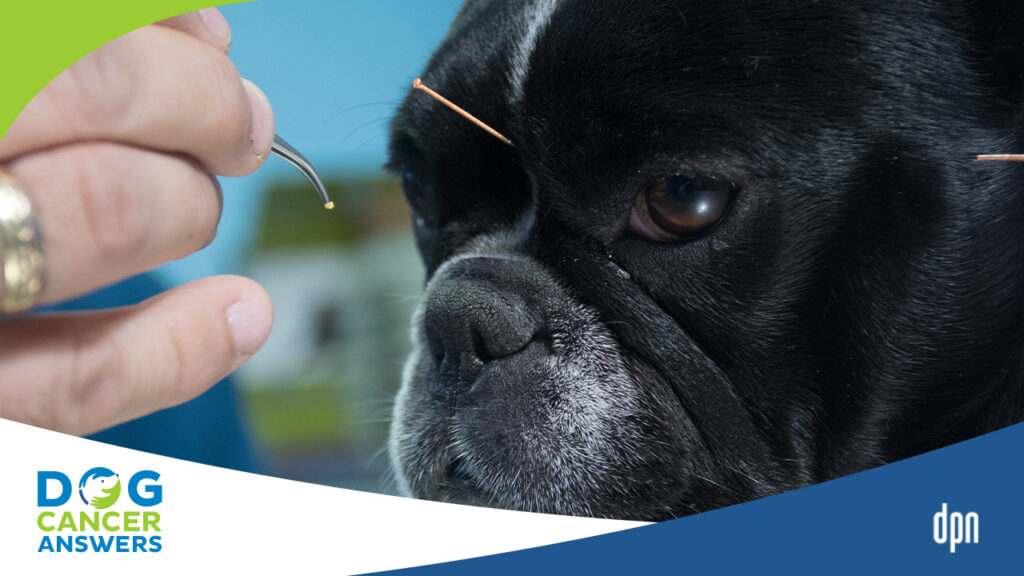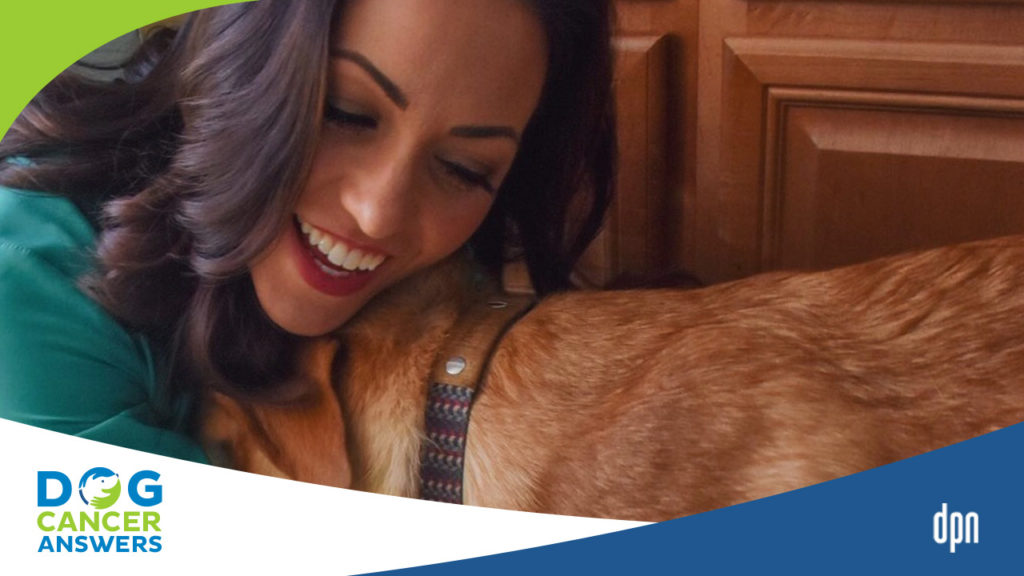EPISODE 90 | RELEASED October 5, 2020
Treating Dog Cancer Naturally – Why I made the Switch to Becoming a Holistic Veterinarian | Dr. Katie Woodley Deep Dive
Dr. Katie Woodley has one goal besides treating the patient: reminding their pet parents that there is hope in alternative therapies.
SHOW NOTES
Dr. Katie Woodley’s career began as a traditional veterinarian. That eventually changed after her husband was diagnosed with an autoimmune disorder. Soon after, her beloved German Shepard, Finn, had a seizure, which later turned out to be a malignant brain tumor.
When comparing the side effects of both allopathic and natural medicine on her husband and Finn, she realized that all pet owners should be aware of their holistic options. This led her to become certified in acupuncture and Chinese herbal medicine (CHM). Through The Natural Pet Doctor, Katie provides integrative options for pet parents and strives to bridge the gap between holistic and traditional veterinarians in Colorado and beyond.
In this episode, Dr. Woodley will delve deeper into her path towards integrative medicine, provide tips for pet owners who are seeking holistic treatment and shares important advice about expectations vs. reality when your dog is put on a holistic treatment plan for cancer.
Links Mentioned in Today’s Show:
The Natural Pet Doctor Website: https://www.thenaturalpetdoctor.com/
American Holistic Veterinary Medical Association (AHVMA) Website: https://www.ahvma.org
AHVMA Vet Finder:/ https://ahvma.org/find-a-holistic-veterinarian
[00:00:00] >> Dr. Katie Woodley: When we get a cancer diagnosis for our pets for ourselves, it’s a really a time for reflection and go what’s the most important thing in our lives?
[00:00:10] >> Announcer: Welcome to Dog Cancer Answers, where we help you help your dog with cancer. Here’s your host, James Jacobson.
[00:00:19] >> James Jacobson: Did you ever think it was possible for traditional and non-traditional vets to work together on your dog’s cancer treatment?
[00:00:26] Well, I’m here to tell you that it is, and there are plenty of options out there. To talk more about this holistic veterinarian, Dr. Katie Woodley joins us today, but before we jump in a big thank you or Mahalo, as we say, here in Hawaii to today’s sponsor, The Dog Cancer Survival Guide. That is the best-selling animal health book written by Dr. Demian Dressler and Susan Ettinger. It’s considered the bible of dog cancer and you can get it wherever fine books are sold or online at DogCancerBook.com.
[00:00:57] Dr. Katie Woodley originally practiced as a conventional veterinarian, but that soon changed after her husband was diagnosed with colitis and her dog, Finn with cancer. After seeing the positive effects of holistic medicine that they had on both her husband and on Finn, she delved deeper into traditional Chinese medicine and eventually started her own holistic veterinary service, The Natural Pet Doctor, which continues to bridge the gap between traditional and non-traditional veterinary practices. Thank you for being with us, Dr. Katie Woodley. I’m glad you’re here.
[00:01:35] >> Dr. Katie Woodley: Thanks for having me. I appreciate being here.
[00:01:38] >> James Jacobson: So you have a really interesting journey to the type of veterinary medicine that you practice. Tell us about that.
[00:01:47] >> Dr. Katie Woodley: Yeah. So I am technically a holistic veterinarian. However, I didn’t start that way. And so back when I first became a vet, I am from Colorado originally and went to vet school in New Zealand, lived on a little light.
[00:02:01] >> James Jacobson: Well, of course, New Zealand. Why would you? You don’t just pass over that. New Zealand?
[00:02:06] >> Dr. Katie Woodley: Yeah, I went to New Zealand.
[00:02:07] >> James Jacobson: Why did you choose to go to New Zealand?
[00:02:09] >> Dr. Katie Woodley: So when I was in my undergrad, applying for vet schools and waiting to hear back, I found out about New Zealand’s vet school. So Massey University. It was accredited. So it was the same as going to Colorado State, but it was in New Zealand.
[00:02:25] So I was like, why not just apply? See what happens. And I got in and I, honestly, if I had gotten into CSU, I still would’ve gone to New Zealand. Great adventure, beautiful country, nothing was holding me back and I got to become a veterinarian in a really neat different place.
[00:02:40] >> James Jacobson: Okay. So you had pursued your traditional, non holistic veterinary education in New Zealand, but what was the thing that made you say, okay, I’m going to pursue this.
[00:02:50] >> Dr. Katie Woodley: The biggest thing was seeing the results that my husband got.
[00:02:54] >> James Jacobson: Let’s dig a little deeper into that. So what kind of, it was colitis or what was it?
[00:02:59] >> Dr. Katie Woodley: Yeah, so he was diagnosed with ulcerative colitis. It’s kind of a downgrade from Crohn’s disease, but very similar. So there’s not a lot of good treatments. Biologic drugs are the treatment of choice.
[00:03:11] They can come with severe side effects and you never know if you’re going to get side effects. And so we went down the path of looking for more natural routes with nutrition and supplements and herbal medicine too. And acupuncture. So I gained a lot of knowledge doing that research and started to kind of translate it over to the pets.
[00:03:32] >> James Jacobson: Was that both of your first impulses to go the more holistic route, or did he try traditional medicine first?
[00:03:41] >> Dr. Katie Woodley: Yeah. So we’ve always been ones to cook for ourselves and use real food and not take like pain medicine if you have a headache and he didn’t want to go on those strong drugs. And so he ended up going on biologics and he felt great. Gained back weight, and then he had a colonoscopy and it was the worst that he had been.
[00:04:00] That was an eye-opener. He’s like, nope. We’re done. I’m going off of it. I don’t care. Like I’m not going to feel good and the disease is still ravaging my body. So it was really interesting going down that path and working with conventional doctors too who don’t necessarily believe food batters. So that’s something that was really difficult and hard to work around. Just very limited mindsets.
[00:04:23] >> James Jacobson: Paint the picture for me. So you were accompanying him to his appointments, I’m assuming. And then, you know, you say hi, I’m Dr. Katie Woodley. Oh doctor, what are you? What doctor of what?
[00:04:33] >> Dr. Katie Woodley: Never said I was a doctor.
[00:04:34] >> James Jacobson: Okay. Okay.
[00:04:34] >> Dr. Katie Woodley: That’s not where I wanted to go on those appointments. I kind of hung out in the background and asked some questions and ’cause the thing is like, I’m not the backup for doctors and like to make them worried and on edge. I don’t to hear what they have to say.
[00:04:47] I want to hear like the treatment options that we have and then ask the questions. And of course they can figure out like, oh, you know something. And I’m like, yeah, I actually am a vet.
[00:04:57] >> James Jacobson: Well, I’m curious if there are any analogies or ah-has or distinctions that you got from the interactions that you were having with your husband’s physicians and the way your clients may view your practice or veterinary medicine in general.
[00:05:13] >> Dr. Katie Woodley: There’s definitely similarities. And I think that’s one of my biggest missions with my business, The Natural Pet Doctor, is helping clients to have options, but also working with conventional doctors to showcase that it’s not scary and we can work together because a lot of those conventional vets don’t get the education at vet school so they don’t know about it.
[00:05:36] But what happens is, is when these clients go to them, go to their conventional vet and they ask, what about essential oils? What about herbal medicine? And they just shut them down and they say, no, that doesn’t work. It causes issues. What they just did is they lost a client because they’re probably like me.
[00:05:53] Most of them, what happens is they’re sitting in that exam room and they’re feeling shut down and you’re like, well, they’re not on my team. I have to find someone else to be on my team. And then that’s where they find me. And I see it every day. Every day that happens.
[00:06:10] >> James Jacobson: Was acupuncture the first thing that you started to pursue?
[00:06:13] >> Dr. Katie Woodley: It was, and this is actually kind of ironic. So it was the first thing I pursued because I took the program med, well it’s called CuraCore now. So it’s a scientific based acupuncture. And the reason why I chose that is because I worked with some older veterinarians that didn’t agree with holistic medicine.
[00:06:31] So I found this science-based one, so I could get certified and then go into that path and start integrating it and show them how it worked. So that’s part of the journey and then going down the Chinese herbal medicine diploma route being able to integrate in, okay, how do we explain acupuncture from both the Chinese medicine viewpoint and a conventional viewpoint?
[00:06:54] And I feel very lucky that I can do both because not every client wants to hear the Chinese medicine side, but they work the same.
[00:07:00] >> James Jacobson: Okay. And then when you started doing TCM, there’s so many things related to traditional Chinese medicine, where did you focus or were you just sort of doing a overview of everything?
[00:07:10] >> Dr. Katie Woodley: So what I did is, this is actually what brought me up to Fort Collins. So we moved back to Colorado Springs and I was kind of at a standstill with how far I could go with my holistic, just because of the belief system and the practice, which is fine. And so I started looking for jobs and found this job in Fort Collins, where they wanted a holistic integrative practitioner to really develop the area ’cause even being near CSU and in this town with thousands of vets, there’s not a lot of people that do what I do.
[00:07:40] >> James Jacobson: So for our listeners, CSU is?
[00:07:42] >> Dr. Katie Woodley: Colorado State University.
[00:07:44] >> James Jacobson: But it’s one of the more esteemed veterinary schools in America.
[00:07:47] >> Dr. Katie Woodley: Correct.
[00:07:48] >> James Jacobson: And it turns out a lot of traditional allopathic veterinarians. And so a vet practice in that town wanted specifically someone who’s going to focus more specifically on holistic medicine. And you were that person in a town that is filled with veterinarians.
[00:08:07] >> Dr. Katie Woodley: Correct. And so what I did is I actually completed a two year graduate diploma for Chinese herbal medicine, just going way deep and getting that diploma and learning all the little intricacies and how to implement Chinese herbal medicine into my practice. And then also being able to correlate the acupuncture too with Chinese medicine.
[00:08:29] >> James Jacobson: Okay. And so I guess I’m wondering, with all those vets in town, do you end up having clients who are those vets and who come from CSU?
[00:08:39] >> Dr. Katie Woodley: There is a transition that has to happen. So it’s a slower transition. So I left that practice to start my own business that focuses solely on holistic medicine. And I think being away from that practice definitely helps with me being able to cultivate positive relationships with the veterinarians, because also I don’t do the conventional side.
[00:09:03] I have to partner with conventional vets. So we have to work together. I can’t steal their clients. I can’t take their clients from them. So I think that also helps too. I’m not as scary. So there are a lot of referrals that go back and forth now with veterinary clinics. And there’s a lot of education that has to take place to showcase like this actually works.
[00:09:23] It works with your medications. And we partner together, which is really fun. And I enjoy that part. Being able to show them like, look at this pet that was really painful and now they’re not painful and they don’t actually need those drugs anymore. And we helped resolve that underlying issue.
[00:09:38] >> James Jacobson: So they do refer out to you as a specialist. And how do you build yourself? How do you describe yourself that they would refer out to you?
[00:09:45] >> Dr. Katie Woodley: So the biggest way I would describe what I do is, I mean, I’m a holistic veterinarian that specializes in acupuncture, Chinese herbal medicine, and nutrition. So talking about how we can use food therapy to fix disease.
[00:09:57] So when I’m talking to these vets, what we’re doing is we’re integrating a treatment plan with their expertise alongside mine. So the client stays with them. The client is happier. The pet is happier and the pet lives longer with more vibrancy.
[00:10:13] >> James Jacobson: That’s a really cool positioning statement. Now, the real question is, are any of those CSU vets, your clients in terms of like with their own pets, like my dog needs acupuncture, I’m going to Dr. Katie.
[00:10:24] >> Dr. Katie Woodley: They are starting to convert, which is fantastic. So they see their patients doing well. And so we are getting more, which is really exciting. I’ll tell you the people that I do get, the other holistic human practitioners.
[00:10:37] >> James Jacobson: Tell me about that.
[00:10:38] >> Dr. Katie Woodley: So I treat a lot of like acupuncturist dogs, so human acupuncturists.
[00:10:43] And then of course herbalists, and I love working with them because they know the language, they speak the language, they know how it works in human health.
[00:10:51] >> James Jacobson: I’ve been hearing more and more of this house call thing, which is really, really interesting. Tell me a little bit about that.
[00:10:59] >> Dr. Katie Woodley: I don’t have a set practice, so I do house consultations.
[00:11:02] So I go to the client in the Northern Colorado region. I love them because you get to see the pet in their normal environment. So you don’t get the fear, the stress of going to the vet clinic. So I can assess that patient really well. I can see if they truly are anxious. I can also see, like where pain is. I can see also the dynamics of the household.
[00:11:21] Super interesting seeing family dynamics when you go in. You’re like get to see the whole family, how they interact and how they interact with the pet. And then you can also see, too, the home environment. So if there is pain and things like that, you can adapt their environment more easily, which helps that pet.
[00:11:38] So with the house consultations people really like it. They don’t have to leave, do anything, especially right now.
[00:11:44] >> James Jacobson: Then also imagine that the pandemic, the world that we live in today, must’ve impacted that some way.
[00:11:49] >> Dr. Katie Woodley: So we’ve been doing a lot of appointments outside, of course, so, which makes it interesting. I’m wearing masks and all the protective equipment and all those things, but normally when we’re in more normal times, we don’t need all those things. It’s a great way to assess the pets and see them in their normal environment. Now with the pandemic, my business grew. And the reason why is because I offer the tele-health for people that don’t have access to a holistic practitioner, as long as they’re working with a conventional vet and we can partner with them, we can offer them those additional therapies.
[00:12:22] So with a lot of clinics closing down, they still had options. The other thing that I do is I do a lot of online education, which exploded during pandemic. So I have an online side of my business too, because I love educating pet parents, because there’s not enough of me and other holistic vets and so doing webinars and doing lots of Instagram and Facebook posts, and I have a pet membership group, and there’s all sorts of ways that we can help educate people so that we can teach them and empower them to be able to take better care of their pets, using food, using supplements appropriately, and also helping them to ask the right questions when they go to the veterinarian.
[00:13:06] >> James Jacobson: Those are some great resources for our listeners, but Dr. Woodley let’s take a break right now. And when we come back, I want to talk to you more about your dog, Finn and how holistic treatments impacted his life after you discovered his brain tumor.
[00:13:20] Today’s episode of Dog Cancer Answers is brought to you by the best-selling animal health book, The Dog Cancer Survival Guide: Full Spectrum Treatments to Optimize Your Dog’s Life Quality and Longevity, by Dr. Demian Dressler and Dr. Susan Ettinger, an oncologist in New York. In a minute, I will tell you how they get their book at a discount. This book covers everything that you need to help your dog fight and even beat cancer. From standard treatment options, surgery, chemotherapy, and radiation, all the way to diet and supplements and mind, body medicine. The Dog Cancer Survival Guide covers many of the subjects that Dr. Woodley and I are discussing on today’s show. The book is available wherever fine books are sold, both online and in physical bookstores. And you can help support this podcast by using a coupon code in getting The Dog Cancer Survival Guide right away, direct from the publisher. It’s available either in paperback and there is free shipping to any address in the USA or as an e-book, and the e-book is under $10. The website to get either the paperback or the e-book is DogCancerBook.com. And you can save 10% if you use the promo code when you check out. PODCAST, use that when you check out and you can save 10%, the website again, DogCancerBook.com and you use that promo code PODCAST for 10% off at www.DogCancerBook.com.
[00:14:48] We’re back with Dr. Katie Woodley. Doctor, now that we have your backstory, let’s talk a little bit about cancer and how you ended up dealing with it with your dog, Finn.
[00:14:57] >> Dr. Katie Woodley: Oh, the sad story. So one of the most common things I see other than allergies is cancer. And unfortunately, as you know, with the amazing work that you do, you know, one out of three dogs will develop cancer at some point in their life.
[00:15:13] And unfortunately, that number is increasing. And so with our shepherd, I haven’t been a holistic that my entire career. We got him when he was an eight week old puppy. I was in vet school. I think it was second year of vet school.
[00:15:26] >> James Jacobson: Oh, you brought him from New Zealand?
[00:15:27] >> Dr. Katie Woodley: I did. And we had two cats, two that also passed away from cancer.
[00:15:31] So not a good track record with our pets, unfortunately. So we got him in New Zealand. He was raised on a kibble diet. They had Nutro, you know, rotate through the German Shepherd ones. Got all his vaccines, flea and tick preventatives got all the things that you’re taught, you’re supposed to do to raise a healthy pup.
[00:15:49] And so we brought him to the States. He moved around with us. He had two torn cruciate ligaments that we were able to rehab. He didn’t actually need surgery. He did really well. And as I started, did acupuncture on him. Once my first acupuncture patient seven years ago. And as I started going into the realm of the Chinese medicine and the nutritional aspect, changed him over to a home cooked diet and he was on herbs. Doing pretty well.
[00:16:16] However, when we moved to Fort Collins. So we had been here for probably about two or three years, started having seizures one night. And of course being a vet I’m like he has a brain tumor right away. He has a brain tumor. I know he has a brain tumor. So we went down the path of doing the CT scan, diagnosing it.
[00:16:35] We put him on the conventional drugs, the phenobarb, the seizure meds, the prednisone, because the neurologist was actually surprised that he didn’t herniate his brain during the CT scan. She said he has so much brain swelling, but he did so well. I don’t know why. I was like I do, because he’s had holistic for like the past six years.
[00:16:55] And you know, other than this silly brain tumor, you know, he’s been on these herbs that help reduce inflammation for his knees and his aging body and the curcumin and like all the things, but it wasn’t enough to stop a brain tumor. So he had never been really on drugs before. And his appetite has always been fantastic his entire life. Immediately, first week of going on these drugs couldn’t walk. He wouldn’t eat. He was vomiting. He had diarrhea. Drinking nonstop. He had every single side effect to all those drugs that you could list. And I was like, I’m not doing this. I can’t do this to him. I was like, this isn’t fair.
[00:17:35] We’re at, you know, 10, 11 years old. I’m not going to make him suffer for the last part of his life. And if we have to put him down next week, then that’s what it is. So I told the doctor, a colleague, that I’m not going to do this. I’m going to do my holistic stuff. And the response I received was something that my clients probably hear a lot.
[00:17:57] And it was good luck with that. I’ll see you in a week. And I was like, okay. That’s fine. And so I said, I’m going to do my things, and if they work, fantastic. And so I’ve changed his herbs, I changed his nutrition, food therapy and, you know, did the whole cancer diet. Reducing the carbohydrate content, using cooling proteins, making sure we have a lot of phytonutrients and then acupuncture for seizure control and to helping to reduce heat and all the things.
[00:18:28] And he lived for another 10 months, almost 11 months. So it was one of those things where though seeing him do so well through the treatment really drove home my mission and to make sure that pet parents have this option because without it, Finn would have been gone and he had an amazing quality of life. The neighbors, didn’t even realize that he had cancer.
[00:18:51] >> James Jacobson: When you saw the effects that Finn had with, you know, prednisone and basically a litany of other things, everything that could go wrong, all those adverse reactions, what did that feel like to you?
[00:19:02] >> Dr. Katie Woodley: So I, there is a time and a place for conventional meds and a lot of pets do really well. So what I take from that based on the training that I’ve had is side effects to conventional drugs tell me what is going on in the body. So I knew what herbs to use for Finn and to what to change him over to. So side effects don’t scare me. They tell me a lot about imbalances in the body. Whereas, if we have a side effect from nonsteroidals, it also tells me what’s going on in the body too, so that we can use herbs to address that and help fix whatever may have happened.
[00:19:34] So for him, like I’m not afraid to do conventional meds. And I knew we had to try something. However, there was no way he could stay on it. Like, I mean, we couldn’t have done surgery. We could have done brain surgery. We could have done radiation therapy. However, the tumor is right next to his optic nerve and he would go blind.
[00:19:54] So it’s like, what else do we have? And I had pet insurance. So thank goodness. So if you don’t have pet insurance and your pet is healthy, please get pet insurance or else we would have spent you know, over $20,000 on him. That’s what we spent in the last year, but we pay 10% because of pet insurance.
[00:20:11] And it also took away the financial aspect in making those decisions. So if I had wanted to do surgery, we could have, it just, wasn’t going to benefit him more versus the side effects that could potentially happen.
[00:20:24] >> James Jacobson: There are few places in America where you can say, I want to have brain surgery in my dog, and I can just go down the street and do it.
[00:20:31] >> Dr. Katie Woodley: Yeah. I had every option and so very thankful, very lucky. And I love that because the clients I see here, they have all the options and that’s really important. Like what are all your options? And then go through what’s best for you. What’s best for your pet. What’s best for the family and going from there and making that decision.
[00:20:51] >> James Jacobson: Why was it so expensive considering that you did a lot of the holistic options. Why was it $20,000?
[00:20:56] >> Dr. Katie Woodley: CT scan was a ton. So, um, that was a good chunk of money. The x-rays, the follow-ups, the ruling out like fungal disease. So a lot of the diagnostics that you do up to that point are really expensive.
[00:21:11] So I was very lucky I could use my acupuncture needle, so I didn’t have to pay myself to do the treatments, but that would have been an additional cost. The herbal medicine, feeding a home cooked diet to a 75 pound dog is not cheap. The supplements, they do add up. That, I mean, nothing is free. And so when people want to go into the holistic realm, you know, there is a cost associated with it, but there’s also a cost associated with potential side effects to drugs, the drugs, themselves, surgeries, follow-up blood work, all those things.
[00:21:42] So there will always be a cost to treatment, no matter which route you choose. So you just have to weigh it up for yourself and like, what’s more beneficial for you. Your pet. Your financial situation and what feels good to you also so you don’t have the regrets and those things at the end of the line, when you have to put your pet down. You don’t want to regret not being able to do the things that you feel like you should have done.
[00:22:06] >> James Jacobson: And you wrote a really interesting blog post, and we’ll put a link to that, about five things that you’ve learned from Finn’s journey. Are there any points that you would like to share with our audience about that?
[00:22:16] >> Dr. Katie Woodley: The biggest thing that I’ve learned and also working with a lot of clients at the end of life, he was my soul pup.
[00:22:23] Like I may cry when talking about him, ’cause I still, even, almost six months later, yeah I miss him. And there’s things that, you know, I see things or I drive by the park we used to walk through. And however, the biggest thing he taught me is to be present. And I’m so grateful that I wasn’t working every day at the clinic and not being able to spend time with him. Being able to be a house call practitioner and have my own business, I was very lucky that every time I took a break, I would go and sit with him because I knew his time was limited. And give him a pat and really be present. And I probably got less work done during that time, but I knew he wasn’t going to be around. And I think when we get a cancer diagnosis for our pets, for ourselves, it’s a really a time for reflection and go what’s the most important thing in our lives? It’s not to race around and not be present. You know, feel the sun on your face and sit in that grass with your dog and just enjoy a nice spring day. Like he loves sitting in the grass under the tree. And so whenever I go outside now and read a book, I remember him and remember the good things.
[00:23:29] The other thing is a lot of people hold on to feeling guilty that they didn’t do enough or that they didn’t fix it or that they caused cancer in some way. And I’ve gone through all of that. So I can relate. I even catch myself saying this now. I wish I had started this sooner, but I didn’t know about it. And so I can’t hold that against myself.
[00:23:50] And I see people holding onto feeling guilty and guilt. And what it does is it eats away at them. And it doesn’t allow you to enjoy the time with your pets that are left over or enjoy your life. If your pets are gone, embrace it, let it be, let the grief set, let it soak in and don’t let it make you feel bad that you still feel grief and you still cry 10 years later over your dog ’cause I probably will. And I really, really want pet parents to know that and feel that and allow themselves to be okay. Like if we could all live forever, we would. But at some point we can’t win the race. Like we’re running a race that we will not win. That’s just a fact. Like we all go at some stage and we never know when we’re going to go so that’s why we really need to be present and also be kind to ourselves and, you know, just live, you know, that’s the biggest thing Finn taught us to like go and do the things. Go to the lake. Go to the river. Even if you’re like, I’m so tired, like Finn loved it. And I wish I had done that more with him.
[00:24:52] >> James Jacobson: If you have some tips about herbs that you liked and that you use in your practice now as a result of your experience with Finn, I’d love to hear that. What do you recommend for cancer herb-wise?
[00:25:02] >> Dr. Katie Woodley: The biggest thing, when you talk a lot about nutrition and supplements and herbs for cancer patients, is working with someone that knows what they’re doing because herbs can cause issues if they’re used inappropriately. And so I find a lot of people will go and do Chinese herbs themselves, but they don’t have the training.
[00:25:20] And I think that’s really important. And one of the things that gives it a bad name for conventional vets and makes them scared to recommend it, because they’re sourcing the herbs through like Amazon and Chinese herbs can be contaminated with heavy metals and lead and they could be counterfeit. So I never recommend going through Amazon for Chinese herbs.
[00:25:42] And also you have to understand the basis and the principles of Chinese medicine and where those imbalances are. It’s not as simple as just treating inflammation. There’s different pathways and each pet is an individual. So I think that’s really important for pet parents to, to know and understand. It’s not as simple as going and getting Nordic Naturals fish oil, and also making sure you’re working with a veterinarian that is able to assess, is that product, the right one, because if we have a pet that has a lot of heat and we use a product like a herbal medicine that actually increases like warmth and heat in the body, were going to make them worse.
[00:26:21] And one of the take home points that I would love for pet parents to have too is when they’re told there’s nothing more. To go to those resources, go to the American Holistic Veterinary Medical Association and find a veterinarian that can partner with them because like we mentioned, the loss of hope is so big.
[00:26:39] >> James Jacobson: If today’s Dr. Katie Woodley would talk to the doctor, Katie Woodley, who just found out that, that first night when Finn had his seizure, what would you say?
[00:26:49] >> Dr. Katie Woodley: You know, to be honest, I feel like I’m not that much different than I was that night because I knew I had options. And I think if I had not gone down the holistic path and it would be a very different situation, there would be loss of hope and depression and sadness.
[00:27:07] And the biggest thing too, though, that I learned from that because my husband doesn’t have the medical background and sometimes we assume as vets like our partners know the things and understand what’s going on, but keeping him more aware of like what was happening and what was gonna happen, like I knew he would go at some point, but he wasn’t sure if it was his time yet.
[00:27:29] And he was in a place where he was having seizures every three hours for a couple of days. And like it wasn’t working. And I was like, we can’t continue this. He changed, his personality changed. He’s just pacing. He couldn’t sleep without having a seizure. That’s why we put him down. However, my husband thought he wasn’t in pain and I’m like, he couldn’t sleep without a seizure.
[00:27:49] So, but that really showed me like, these are what my clients are thinking. And I need to be able to educate them. So we’re preparing them because a lot of times with herbal medicine, they’re doing great and they might have like little blips. A lot of times with conventional medicine, we go through these ups and downs and these valleys where they feel really bad.
[00:28:09] And you’re like, I don’t know if it’s time and then they’ll have a day where they feel really good. And it’s like this torture cycle, emotional cycle. And with herbal medicine, a lot of times what happens is those downtimes are a lot less, and less in between. And so the client starts feeling like, and I found this myself, he’s going into remission.
[00:28:27] The tumor is gone. Maybe it’s gone. Like he hasn’t had a seizure in like five months. And the thing is, is that the herbs help to a certain extent. They keep them feeling good. They keep their vibrancy up. They keep their appetite up. And then there comes a day where the cancer is like, nope. The time is now and it takes over and there’s no more things that we can do.
[00:28:49] We call it the chi, the energy. The energy is gone and that’s really hard. And that’s where a lot of pets will pass away in their sleep and you wake up and you’re like, they were doing so good. What happened? That’s what happened. And so I think making sure that pet parents know that process, especially if they are using the herbal medicine route is really important, or it can be really scary when you get to the end and you’re not prepared because you felt like your pet was potentially beating that cancer and it was completely gone and it was never going to come back.
[00:29:18] >> James Jacobson: I’m so glad we covered that. That’s such an important distinction that most people never get. And they were so shocked with like, everything was fine and then it just stopped.
[00:29:26] >> Dr. Katie Woodley: Yeah. And it’s the same with conventional, right? Like we do chemotherapy and radiation.
[00:29:30] >> James Jacobson: But those are usually the ups and downs and stuff like that. So which, which would you rather have in terms of their quality of life? You have to go like going off in your sleep is pretty good way of going.
[00:29:39] >> Dr. Katie Woodley: Yeah. And we all want that, right?
[00:29:42] >> James Jacobson: Absolutely
[00:29:43] Dr. Kelly Woodley. Thank you so much for being with us today.
[00:29:46] >> Dr. Katie Woodley: Well, thank you so much for having me. I truly appreciate it.
[00:29:51] >> James Jacobson: Dr. Woodley shared some important reminders that we can all benefit, by heeding things like appreciate every moment with your dog and above all, be kind to yourself. And by doing this in your dog’s final moments, whenever those come, you’ll know that you have done your best.
[00:30:09] So don’t be afraid to ask questions and ultimately trust yourself as your dog’s guardian.
[00:30:19] Those touchstones remind me to remind you that our veterinarians are on-call at our listener line. If you have a question for a dog cancer vet, please call our listener line and record your question. We’ll pose it to one of our veterinary experts and your question and their answer will appear on a future episode of Dog Cancer Answers. The telephone number, 24 hours a day, is (808) 868-3200, or visit our website, DogCancerAnswers.com. Also, if you want to hear more episodes like this, please subscribe to our podcast on Apple Podcasts or Spotify or wherever you listen. Share us on social media. We’re on Instagram and Facebook and YouTube. Please help spread the word about this show because we want to help as many dog lovers as possible and your likes and your shares and your ratings help other dog lovers find us.
[00:31:13] Also, if you want to reach out to us, visit our website, where we have tons of additional information to help you navigate dog cancer. The URL, DogCancerAnswers.com. We’d like to thank our sponsor, The Dog Cancer Survival Guide book by Dr. Demian Dressler and Dr. Sue Ettinger. The book is available wherever fine books are sold, online and in physical bookstores. And remember if you’d like to help support us, you can get the book today direct from the publisher, Maui Media. The website is DogCancerBook.com. And if you use the promo code PODCAST when you check out, you’ll save 10%. The website www.DogCancerBook.com.
[00:31:57] And finally, I’d like to thank Dr. Katie Woodley for being our guest today. You can reach her on her website, TheNaturalPetDoctor.com. Until next time. I am James Jacobson. From all of us here at Dog Cancer Answers and Dog Podcast Network, I wish you and your dog, a warm, Aloha.
[00:32:20] >> Announcer: Thank you for listening to Dog Cancer Answers. If you’d like to connect, please visit our website at DogCancerAnswers.com or call our listener line at (808) 868-3200. And here’s a friendly reminder that you probably already know, this podcast is provided for informational and educational purposes only. It’s not meant to take the place at the advice you receive from your dog’s veterinarian.
[00:32:44] Only veterinarians who examine your dog can give you veterinary advice or diagnose your dog’s medical condition. Your reliance on the information you hear on this podcast is solely at your own risk. If your dog has a specific health problem, contact your veterinarian. Also, please keep in mind that veterinary information can change rapidly, therefore, some information may be out of date. Dog Cancer Answers is a presentation of Maui Media in association with Dog Podcast Network.
Hosted By
SUBSCRIBE ON YOUR FAVORITE PLATFORM
Topics
Editor's Picks
CATEGORY
